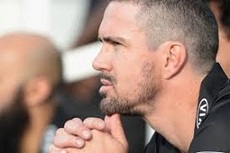
Being in the BBC squad in Brazil makes it the first time Phil Neville’s ever been picked for a World Cup, and it’s fair to say that the Beeb’s sports producers might have thought they were on to a winner since his brother, Gary, has made such a good impression with his early work for Sky. As a coach to Roy Hodgson’s England team, Gary Neville was not available.
BBC Sport might have wished that brother Phil Neville had not been available, either, after his debacle of a debut as a co-commentator for England’s opening game against Italy, which attracted 445 complaints. That makes Phil Neville less to the public taste than Luis Suarez.
Neville also found himself as the subject of a Peter Oborne column in the Telegraph. Comparing Neville unfavourably to some of the BBC’s great sports commentators of the past, including Peter O’Sullevan and David Coleman (who had both had backgrounds in print journalism), Oborne weighed in with, “Mr Neville speaks in a monotone, comes across as inarticulate, seems incapable of coming up with an original thought and bores viewers to death”.
In the Telegraph, Oborne warmed to his theme: “Modern sports producers do not value broadcasting or communication skills any longer. In this debauched age of celebrity journalism, all they want is that recognisable name.”
Oborne may have a point.
But newspapers, too, tend to express dubious levels of excitement whenever they use a picture byline of a former sports star. Indeed, in the week before Oborne’s column appeared, one national newspaper issued a triumphant press release to announce that, presumably at great cost to the sports desk’s budget, they had just signed up former England cricket captain, Kevin Pietersen (pictured above).
The newspaper in question? The Daily Telegraph, of course.

 RSS Feed
RSS Feed


